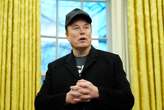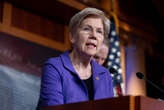As a former military officer turned sustainability-focused CEO, I often find myself reflecting on the intersection of two worlds that, on the surface, seem unlikely companions. The military and environmental activism may not share much in popular perception, but my time in service fundamentally shaped how I approach mission-driven leadership. It gave me the tools to tackle complex, seemingly insurmountable problems while galvanizing a team toward a higher purpose. If we are to solve the key challenges of our time—challenges as large as protecting our planet—leaders will need to adopt three key lessons I learned from the military.
Lesson 1: Service before self
The military’s core ethos revolves around serving a mission greater than oneself. For me, this meant uprooting my life every 2 years, enduring long deployments where my husband was gone for 320 days of the year, and working on classified missions I could never share. These sacrifices weren’t about personal glory but about contributing to something bigger: protecting the freedoms and safety of others.
This same mindset is essential in mission-driven leadership. Building a values-driven company that prioritizes the health of people and the planet is an inherently uphill battle. But this work isn’t about personal comfort or short-term wins. It’s about serving a mission that has lasting value for future generations.
One of the greatest leadership challenges is finding and motivating others who share this sense of purpose. In the military, what binds individuals together—even in life-or-death situations—is the shared passion for serving the mission. The same is true for leaders of purpose-driven companies. Surround yourself with people who are deeply committed to the cause. Their shared purpose will provide the resilience and determination needed to face setbacks and keep pushing forward.
In the U.S., we tend to prioritize individual success over collective progress. For me, military service was a catalyst for this mindset shift, and it continues to shape how I approach sustainability: as a duty to serve the greater good.
Lesson 2: Discipline and making excellence a habit
At the United States Air Force Academy, I learned that excellence isn’t a singular act—it’s a habit. This lesson was ingrained in me through daily practices like making my bed with hospital corners, ironing uniforms to perfection, and pushing through grueling physical challenges. These seemingly small acts built the discipline to tackle larger, more complex tasks. The ability to consistently show up and meet high standards—even in the face of fatigue, doubt, or hardship—is the secret weapon that has helped me accomplish the greatest challenges in my life, from running a sub-3-hour marathon to leading a purpose-driven company.
Shaping businesses that improve our health and planet often feels overwhelming. The statistics alone can make you want to throw up your hands: Humans generates over 400 million tons of plastic waste annually, much of which ends up in landfills or the ocean. So instead, focus on the small things laddering up into larger ones. Consider something as simple as making your bed every day. It’s not about the bed itself; it’s about starting the day with a small win, a signal to yourself that you’re committed to doing the work, no matter how small it seems. Discipline drives progress when motivation fades—because motivation will fade. For business leaders, building a culture of disciplined habits is critical. Tackling problems at scale requires a disciplined approach and a team that’s practiced in the excellence of laddering little disciplines up into larger ones.
Are you modeling attention to detail and high standards in your daily work? If not, how can you expect your team to do so when tackling massive societal and environmental challenges?
Leadership in the movement for conscious consumer goods and beyond, requires long-term thinking, consistency, and resilience—all of which are forged through disciplined action. Leaders must show up every day, no matter how difficult the path ahead may seem.
Lesson 3: Integrity, even when no one is looking
In the military, integrity isn’t just a buzzword—it’s a core value. We were trained to do what was right, even when it was inconvenient or when no one was watching. This principle was so critical that a breach of integrity, known as an “honor violation,” could lead to immediate discharge. A friend of mine once faced 6 months of probation because his homework was too similar to his roommate’s. In the business world, integrity often feels like a luxury rather than a necessity. Capitalism is not built this way—companies don’t just do the right thing to feel good. If it doesn’t drive the top or bottom line, it likely won’t make the cut, even when they know their actions are harmful to human health or the environment. However, I believe companies have the potential to be inherently good.
Many companies treat sustainability initiatives as a cost center, doing the bare minimum to meet regulatory requirements or appease consumers. But real progress happens when sustainability is integrated into the business’s core objectives, showing measurable returns that drive the company’s growth. At my company, Novi, we work to build incentive structures that align sustainability efforts with revenue and cost-saving opportunities, ultimately driving both environmental progress, human health, and business success.
For business leaders, integrity means pushing for solutions that don’t just check a box but create meaningful, measurable impact. It’s about holding yourself and your organization accountable to high standards—even when it’s inconvenient or costly—because the stakes for our planet are just as high as they are on the battlefield.
Build a new kind of leadership
The Fast Company Impact Council is a private membership community of influential leaders, experts, executives, and entrepreneurs who share their insights with our audience. Members pay annual membership dues for access to peer learning and thought leadership opportunities, events and more.
As we face the monumental task of preserving our planet for future generations, leaders across disciplines must embrace a mission-first mindset, build the discipline to tackle daunting problems, and act with integrity, even when it’s inconvenient. These principles aren’t just relics of my time in uniform; they’re the guiding forces that help me navigate the complex, high-stakes challenges of mission-driven leadership. The military may have prepared me for battle, but it also prepared me to serve a different kind of mission: protecting the health of people and our planet. And for that, I’ll always be grateful.
Kimberly Shenk is cofounder and CEO of Novi Connect.









No comments